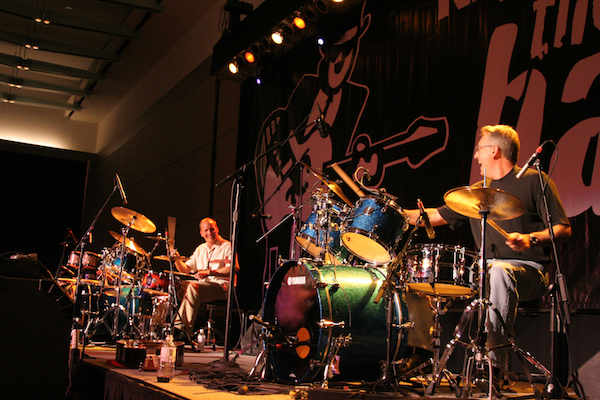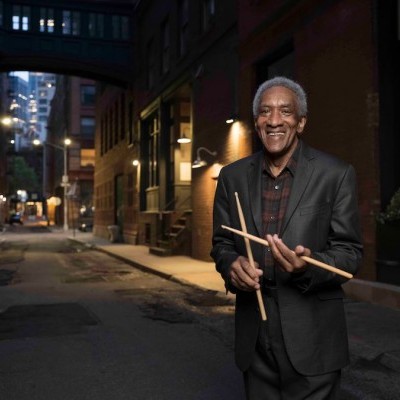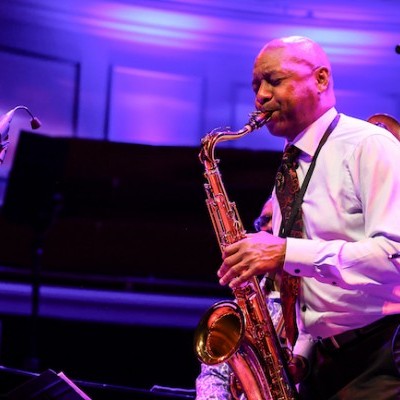Jun 3, 2025 11:25 AM
In Memoriam: Al Foster, 1943–2025
Al Foster, a drummer regarded for his fluency across the bebop, post-bop and funk/fusion lineages of jazz, died May 28…

David Jahnke (left) of Hal Leonard and NAMM President/CEO Joe Lamond perform during a NAMM event in Nashville.
(Photo: Courtesy NAMM)When you say the phrase “career in music,” many people automatically think of recording and touring artists. Earning a living as a full-time musician who records and tours is, indeed, an admirable goal. But those who do achieve the goal find that it can be a challenging life, and it often involves an unpredictable stream of income and struggles with health insurance costs. It is not a career for everyone—even those who are immensely talented players.
So, what are some other career options for artists who have a degree in music and/or extensive musical training? Below is a list of careers one might pursue while he or she is developing a profile as a performing musician. For many of these jobs, an applicant who has musical training will stand out from candidates who lack those skills.
Below are some careers that many musicians decide to do full-time because the gig is wholly rewarding—both emotionally and financially. Here are 50 options to consider.
1. Staff Musician. Many organizations have a need for full-time musicians. When searching for a job, it’s important to think outside the box. Theme parks, cruise ships and many houses of worship employ full-time musicians. So do music production houses, which might deliver music for advertising clients, video game manufacturers or TV shows.
2. Guitar Technician. Many touring musicians employ a guitar technician to care for instruments and keep them in tune. The most popular bands also employ drum and keyboard techs.
3. Piano Tuner. Whether working for a concert hall or operating as a private business, a piano tuner is frequently in demand.
4. Tour Manager. Some of the best people in this field are musicians. Nobody understands the rigors of the road like a musician.
5. Concert Promoter (and support staff). Many of the veterans are aging, and the touring game is changing. There’s room for a new breed with a background in the business.
6. Music Festival Director. Sunny Sumter was advanced enough in her vocal career to open for Shirley Horn, but she found her true calling as executive director of DC JazzFest in Washington, D.C. “When you’ve lived the music, it shows,” Sumter said. “It resonates when you’re talking to sponsors or others in the community. You can reach people, and you have the authenticity that comes with knowing the music from the inside.”
7. Music Festival Hospitality Coordinator. Strictly seasonal, but essential, this role is responsible for ensuring touring artists feel welcome, relaxed and ready to play. As critical to a successful festival as an all-knowing concierge is to a great hotel, the hospitality coordinator has to be able to work well with both major stars and journeymen players.
8. Commercial Music Composer. It’s a visual world, but successful videos—for corporations, large or small, or marketing agencies—need music as well. This an in-demand niche that’s growing quickly.
9. Rehearsal Accompanist for Dance or Vocal Lessons. Traditionally, this has been a great part-time gig for pianists. Drummers and guitarists are also sometimes in demand to help others get ready for the stage. Many musicians do this as a “side gig” to supplement their income.
10. Music Teacher. There are many opportunities to work in educational institutions (with the proper credentials and training), but many music instructors work in other settings. Most communities—even small ones—have a specialized music school or music retail shop that offers lessons. This is a great way to pass on what you’ve learned and influence the next generation.
11. Private Instructor. Teaching private lessons can be extremely lucrative, either as a part-time gig or as a full-time career. One great advantage is that you can set your own hours.
12. High School Music Department Staff. Many schools need support staff to assist teachers and principals.
13. University Music Department Staff. Universities frequently have administrative teams that assist the Music Department. These staffers might assist with applications, auditions, travel plans, meetings and recording sessions.
14. Venue/Concert Hall Manager. From booking shows and promotion to supervising staff, this is a gig where firsthand experience pays dividends.
15. Venue/Concert Stage Manager. You might not be the one performing, but you can help ensure that whoever is onstage has their equipment where they want it and hits at the appointed time.
16. Venue/Concert Hall Marketing Director. No one knows how to market music like another musician. If you’ve booked your own gigs, you likely have the chops to do it on a larger scale.
17. Subscriptions/Ticket Service Director. These jobs exist in huge, corporate ticket agencies as well as smaller, independent operators. Additionally, many large venues have staffers to handle ticket sales and member subscription services. No matter what the setting, those who excel are people who understand the business from the inside.
18. Music Store Staff. Diverse positions exist in the world of music instrument sales and rental. All County Music’s two locations in Florida do a booming business renting band and orchestral instruments to students, and the shops offer a popular rent-to-own program. In 1991, saxophonist/clinician Fred Schiff took over from his parents, who started the business in 1976. His background is priceless in understanding the needs of clients, and he hires staff with music backgrounds. “It’s a natural fit when it comes to relating to our customers,” Schiff said. “We have hired many people with music degrees who for one reason or another decided that they didn’t want to be in a classroom. We have employees who are school representatives, store managers and general managers fitting that description. Our ‘day gig’ allows them the flexibility of still playing when they want.”
19. Musical Instrument Builder/Designer. Regardless of its size, any company that makes instruments needs staff experts who can play.
20. Musical Instrument Marketing Specialist. Nate Tschetter, who has a composition degree from Berklee College of Music, has worked in Yamaha’s marketing department for almost a decade. “My background in harmony was really helpful in designing different styles for small electronic devices,” Tschetter said. “I also had a lot of familiarity with synths and other keyboards, so I created demos for those, and then it was kind of a natural progression for me to move into that product line.” In his current position, Tschetter said he’s always on the lookout for music graduates who are skilled at the areas of video production and business writing.
21. Instrument Technician. Music retailers often employ musicians who tweak and tune up instruments for sales or rentals.
22. Instrument Manufacturer Salesperson. Who better to talk guitars, keyboards or wind instruments to shoppers or band teachers than a musician?
23. Instrument Resale Specialist. Companies like Reverb need musicians to help run the business of reselling used instruments. Additionally, some self-employed musicians supplement their income by refurbishing and selling instruments.
24. Arts Liaison/Administrator for City/County/State. If you want to make a real difference in artists’ lives, this is the place to do it. From approving grant proposals to booking musicians for special occasions, these jobs have tremendous impact on shaping the cultural landscape.
25. A&R Representative. The field of artists and repertoire—commonly known as A&R—is a natural fit for someone with a music background. Having a close rapport with working musicians is essential.
26. Talent Agency Staff member. Those who excel in this field are ones that create a perfect “fit” between artist and client, creating a scenario wherein both parties win.
27. Music Streaming Service Staff member. Streaming services utilize scientific algorithms and as well as personal curators. The latter approach thrives on finding people who know their music and how to relate to listeners.
28. Music Journalist. Not every successful music writer has studied at the post-secondary level, but having knowledge of composition, instrumentation and performance techniques certainly enables you to communicate to an audience with authority. It’s no coincidence that many freelance music journalists are also freelance musicians.
29. Music Photographer. Going for that great shot comes more naturally when you’re in tune with the performers and can sense when something interesting is about to happen onstage. Having a music background also helps photographers develop a rapport with their subjects—as well as clients other industry insiders.
30. Club DJ. The best DJs are in the moment, sensing the mood of the crowd and planning the flow of tunes. The better your performance chops, the better your show will be.
31. Radio DJ (and similar positions for webcasts). From knowing a wide range of music, to understanding rhythm and flow, to conducting productive interviews with artists, the skills of radio hosts are enhanced through immersion in music.
32. Radio Music Director (and similar positions for webcasts). Scratch the best music directors and you’ll likely find a former musician. This is prime territory for influencing tastes and breaking new talent.
33. Business Manager for Musicians. These experts help musicians navigate the financial and pragmatic complexities of the business.
34. Staff Publicist. Record labels, instrument manufacturers and other organizations need knowledgeable people to help publicize their musical products and services.
35. Independent Publicist for Musicians. The best of this breed are former (or current) musicians who can relate to artists as well as critics. The most successful publicists can communicate passionately about the artists they represent while also understanding the media landscape.
36. Recording Studio Manager (and support staff). Studios need staff to help sessions run smoothly, whether it’s scheduling a session of helping a musician find a source for a specific piece of gear.
37. Audio Engineer (in a recording studio). Producers need team members to help bring a final recording to fruition. Great ears are a must, as is a deep understanding of current recording technology and the ability to work well under pressure.
38. Mastering Engineer (in a recording studio). Part craftsperson, part artist, the mastering engineer is an underappreciated and often misunderstood team member in the recording process.
39. Sound Technician (for clubs and concerts). Every touring musician knows that this is the person who can make or break your show. The best ones become the artists’, and audiences’, heroes. Tact, great ears, superior understanding of the room and equipment are all essential components to doing well at this job.
40. Music Supervisor for Film & TV. If you’re a credit junkie, you know who the best people in this field are. A good music supervisor can be as influential as a good film or video editor.
41. Music Clearance Specialist. New music, old music—it all needs publishing/licensing rights to be negotiated and cleared through legal channels, and schedules are often tight.
42. Music Publisher. Publishing companies need musicians on staff help shepherd books through the production and marketing process.
43. Audio System Design/Installation Specialist. It might be a new venue or it might be the house of an audiophile—when people want the sound to be just so, they need someone who understands music and what the technology can accomplish within the given space.
44. Audio System Salesperson. The best audio stores know that selling hi-fi equipment is not like selling cars or appliances. Shoppers want to know that the salesperson understands their passion for music and can match the equipment with their tastes.
45. Staff Positions: Many music-related organizations hire employees who have musical backgrounds. These include The Recording Academy, the Jazz Education Network and various musicians’ labor unions, just to name a few.
Drummer Joe Lamond played in the pop band Tommy Tutone and worked as Todd Rundgren’s tour manager. Since 2001, he’s led the National Association of Music Merchants as president and CEO. How does he apply his musical knowledge to represent NAMM’s 10,000 manufacturers and retailers? “The formal act of learning to play taught me to focus, to persevere and to think about the true ‘end zone’ of playing, which wasn’t to be a great drummer per se, but rather to make music that would move people,” Lamond said. “Being a good listener, having empathy and being able to survive on a tour bus with others for months at a time taught me so much about life. Dealing with the millions of details that come up on the road on a daily basis, solving problems and always remembering to take a moment to enjoy the ride have been the touchstones of every step of this journey. They also happen to be the skills one needs to run a company or an association like NAMM.”
There are many jobs for which musical ability, when combined with additional coursework and specialized training, can lead to a prestigious career—and make you extremely valuable to clients. These include positions such as accountants, attorneys, vocal coaches and physical therapists. A few others are below.
46. Music Librarian. These positions exist in many institutions, including universities and museums. Cataloging music, and retrieving it when needed, is an essential function that requires a broad appreciation of musical history, genres and artists.
47. Music Therapist. Researchers are discovering how important music can be to unlocking emotions and regenerating damaged neurons. With the U.S. population aging, these jobs are also growing in popularity at facilities for senior citizens.
48. Musicologist (Professor of Musicology). These academicians have a deep understanding not only of cultural and geopolitical matters, but also musical techniques.
49. Corporate Executive. Business training paired with musical training can be a potent combination. Risk taking, improvisation and overall creativity come in handy when one is crafting corporate deals that center on music and entertainment.
And finally …
50. Self-employed Artist. Yes, there are scores of people who are actually earn a living as a touring and/or recording musician. Kudos to them. For others, the preceding 49 jobs might spark some ideas for a new career path. DB

Foster was truly a drummer to the stars, including Miles Davis, Sonny Rollins and Joe Henderson.
Jun 3, 2025 11:25 AM
Al Foster, a drummer regarded for his fluency across the bebop, post-bop and funk/fusion lineages of jazz, died May 28…

“Branford’s playing has steadily improved,” says younger brother Wynton Marsalis. “He’s just gotten more and more serious.”
May 20, 2025 11:58 AM
Branford Marsalis was on the road again. Coffee cup in hand, the saxophonist — sporting a gray hoodie and a look of…

“What did I want more of when I was this age?” Sasha Berliner asks when she’s in her teaching mode.
May 13, 2025 12:39 PM
Part of the jazz vibraphone conversation since her late teens, Sasha Berliner has long come across as a fully formed…

Roscoe Mitchell will receive a Lifetime Achievement award at this year’s Vision Festival.
May 27, 2025 6:21 PM
Arts for Art has announced the full lineup for the 2025 Vision Festival, which will run June 2–7 at Roulette…

Benny Benack III and his quartet took the Midwest Jazz Collective’s route for a test run this spring.
Jun 3, 2025 10:31 AM
The time and labor required to tour is, for many musicians, daunting at best and prohibitive at worst. It’s hardly…